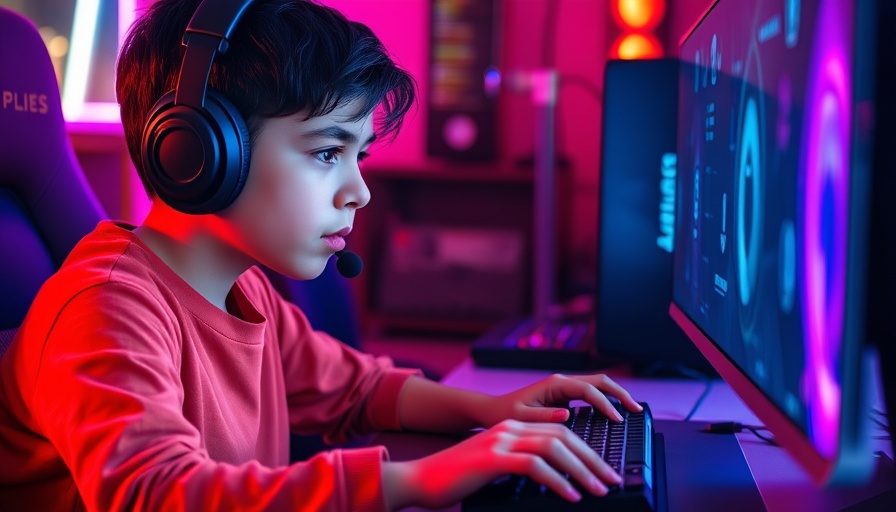
An Innovative Solution to Curb Gaming Addiction
In an age where screens dominate childhood experiences, a growing concern has emerged: gaming addiction among youth. In China, the rapid rise of esports has been accompanied by a troubling surge in addiction rates. Recognizing the need for action, an esports club in Hebei province has introduced a novel 'gaming dissuasion' course aimed at helping children break free from compulsive gaming habits. This course, while well-intentioned, raises ethical questions surrounding its cost and approach.
Understanding the Need for Intervention
Gaming, once seen strictly as a leisure activity, is now proving to be a significant source of stress relief for many children, often at the expense of their mental health and academic performance. Su Chenhao, the owner of this innovative esports club, realized that over 85% of the nearly 4,000 children who trained at his facility showed no signs of becoming professional players; instead, they were simply using gaming as an escape. This led him to launch a course specifically designed to reduce the appeal of gaming.
How the Courses Work
The 'gaming dissuasion' courses consist of intense, marathon gaming sessions that run from 9 a.m. to midnight, interspersed only with meals and light physical exercise. The program is designed to drain the joy out of gaming, turning what was once an enjoyable pastime into a grueling task. Participants like Xiao Dan, who originally dreamed of esports stardom, have reported feeling overwhelmed and in tears as the sessions progressed, highlighting the extreme nature of the program.
The Financial Cost of Breaking Free
The journey to curb gaming addiction comes at a hefty price. The course fees can reach around ₹1.25 lakh (approximately $1,400), a significant investment that has sparked debate about the financial implications of seeking help for addiction. Critics argue that the high cost might deter many families from enrolling their children, raising accessibility issues concerning effective addiction treatment.
Ethical Questions Surrounding the Programs
As supportive as the initiative might sound, challenges linger. Critics question the ethics of commodifying addiction recovery, particularly for children who might not fully understand the cost of participation. It raises the question — should financial barriers exist when addressing a public health issue like gaming addiction? Additionally, the approach of punishing gaming may not necessarily be the most effective path toward a healthier relationship with technology.
Addressing Gaming Addiction Holistically
A growing number of experts advocate for more comprehensive strategies that transcend punitive measures. Healthy gaming habits can be encouraged through education, family involvement, and balanced screen time practices. Parents should foster open conversations about gaming, steering their children toward healthy hobbies, and setting clear boundaries. Utilizing tools and apps to monitor gaming time may also empower families to navigate the gaming landscape more effectively.
Guidance for Concerned Parents
If you are a parent observing signs of potential gaming addiction in your child, consider these actionable insights:
- Start the Conversation: Initiate a dialogue with your child about their gaming habits. Discuss the importance of moderation and explore alternative activities together.
- Set Screen Time Limits: Establish clear limits on gaming times and stick to them, fostering a more balanced daily routine.
- Encourage Physical Activity: Introduce your child to sports or physical hobbies, allowing them to channel energy into healthy pursuits.
- Seek Professional Help: If gaming habits become disruptive, don’t hesitate to seek professional advice or counseling specializing in behavioral issues.
Fostering Awareness and Empathy
Understanding the implications of gaming addiction is crucial for parents and the broader community. It’s a reminder that addiction can mask deeper issues like stress, anxiety, or social pressures. A human-centered approach to combatting gaming addiction involves fostering empathy and support, not judgment or condemnation. Listening to children and understanding their motivations can help them channel their love for gaming in a healthier direction.
A Call to Action for Parents
As we witness the evolving landscape of gaming and its obsessions, it is imperative that we take proactive measures to ensure our children find balance in their lives. Equip yourself with the knowledge and tools to guide your child through the challenges of gaming. Engage in conversations and encourage healthy habits now, not only to combat addiction but to cultivate a fulfilling and well-rounded lifestyle.
 Add Row
Add Row  Add
Add 




Write A Comment